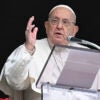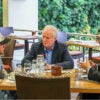On Friday the Kremlin announced that Russia and the U.S. settled all outstanding bilateral issues relating to Russia’s accession to the WTO. “I can say that the United States has removed all the questions regarding Russia joining the WTO,” Russian Finance Minister Alexei Kudrin said, assuring the press that Russia will settle all outstanding issues regarding its accession to the global trade organization within four months at the most.
Later the same day, Russian President Dmitry Medvedev, and U.S. President Barack Obama spoke on the phone. According to the White House, Obama believes that Russia had taken “significant steps” toward joining the WTO.
However, don’t be surprised if this scenario feels a little like déjà vu. In June 2009, at the World Economic Forum in Saint Petersburg, Russia, President Medvedev, Finance Minister Kudrin, and Economy Minister Elvira Nabiullina, together with the Ron Kirk, the U.S. Trade Representative, also said that Russia was about to enter WTO. Yet, two weeks later, Prime Minister Vladimir Putin announced that Russia wouldn’t join the international organization without its Custom Union counterparts Belorussia and Kazakhstan.
The Daily Signal depends on the support of readers like you. Donate now
One year last later Mr. Putin didn’t even wait. He pre-emptively announced that he does not believe that Russia would enter WTO in 2011. As to the economic issues, I tend to believe Putin: if he says “Russia won’t enter,” this means it won’t enter. Then there will be 2012, the presidential election year in Russia, and WTO will not be on the agenda.
Besides this, WTO Secretariat has not yet received the formal notification from Russia or the U.S. about reaching a bilateral agreement. Even if the U.S. agrees to Russia’s WTO membership, Moscow and Washington have to settle outstanding disputes on a number of issues. USTR says that
In separate bilateral agreements also concluded in November 2006, the United States and Russia addressed a number of specific measures impeding U.S. market access, inter alia, sanitary and phyto-sanitary measures particularly covering poultry and meat exports to Russia, reductions in export duties on ferrous metal scrap and copper cathodes, import licensing of information technology products with encryption capability, and intellectual property protection, particularly in the areas of enforcement and the protection of undisclosed information for pharmaceuticals and agricultural chemicals. Implementation of these additional bilateral agreements was not tied to the date of Russia’s accession, and Russia’s implementation of these commitments remains a continuing issue for the United States and Russia.
The U.S. position is critical here, as the United States is the last WTO member conducting bilateral negotiations on Russia’s membership. The other members of the organization resolve minor issues through multilateral consultations.
Besides the unsettled U.S.-Russia issues, the EU and Georgia are also standing in Russia’s way to WTO. Moscow still has to implement a number of legislative changes to bring its regulatory system in line with Europe’s, especially those involving railway transport pricing, agricultural import barriers, and lumber export duties.
Georgia links Russia’s WTO membership with occupation of its territory, and Tbilisi is demanding the establishment of the Georgian border crossings on the Russia-Abkhazia and Russia-South Ossetia borders. Georgia can veto Russia’s accession to WTO, affecting multilateral negotiations.
Finally, the recent legislative initiative of the U.S. Senator Ben Cardin (D–MD) and Representative James McGovern (D–MA) can also affect granting Russia Permanent Normal Trade Relations (PNTR) status, a step necessary for Russia to receive nondiscriminatory access to the U.S. market as a WTO member, and permanently waiving the 1974 Jackson-Vanick Amendment, which blocks PNTR.
Cardin and McGovern proposed to bar U.S. entry for any Russian official linked to the death of Sergei Magnitsky. The Russian attorney Magnitsky worked for the British hedge fund Hermitage Capital in Moscow, which Russian authorities accused of tax evasion, while Hermitage claims that some officials orchestrated a huge fraud. Russian law enforcement officers arrested Magnitsky. He subsequently died in a Moscow prison while under interrogation. A recent Russian investigation established that Magnitsky was tortured and denied adequate medical care. The Magnitsky Bill is likely to create a negative climate for granting PNTR.
Thus, the confluence of the Russian foot-dragging and non-compliance on outstanding trade issues, in addition to U.S. suspicion of the collapsing Russian rule of law may make the Putin prophecy come true: next year we may not see Russian membership in WTO.
—Ariel Cohen, Ph.D., is Senior Research Fellow in Russian and Eurasian Studies and International Energy Security in the Douglas and Sarah Allison Center for Foreign Policy Studies, a division of the Kathryn and Shelby Cullom Davis Institute for International Studies, at The Heritage Foundation.





























